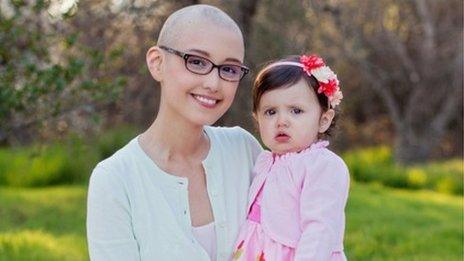US shutdown jeopardises lifeline for dying children
- Published
Chrissy and Amanda Grube
The US government partial shutdown has left vital drug trials on hold, which is a matter of life and death for some patients.
Now in its third week, the budget dispute is delaying eight-year-old Chrissy Grube from getting the treatment that could save her.
Four years ago the soft-spoken third grader was diagnosed with Giant Axonal Neuropathy (GAN), a rare and incurable degenerative disease that often begins at a young age. Already the disease has robbed her of the ability to walk. Her breathing is laboured, and everyday tasks, such as going to the bathroom or getting into the car after school, are an ordeal.
"I'm really scared sometimes," says Chrissy. "It's just my biggest, biggest dream ever to be like other kids, like my friends. It really hurts my heart to be like this, I just sort of feel like I'm trapped."
People with GAN become progressively paralysed, then dependent on a feeding tube and ventilator before they die, usually in their teens or 20s. Chrissy understands that she is only getting worse, and that this disease will probably be what kills her. She also bears the burden of knowing what is to come for her three-year-old sister Amanda, who shows few symptoms now, but also suffers from the disease.
Recent advances in research have offered the Grubes a glimmer of hope. The government does not conduct research on GAN, but a charity called the Hannah's Hope Fund has put forward an experimental gene therapy project that could be the first treatment to stop progression of the disease.
While it would not reverse the damage done, it is Chrissy's only shot at survival. But the shutdown has put all of this on hold, because the body responsible for approving the new treatment, the National Institutes of Health (NIH), remains closed.
"I'm angry, I'm frustrated," says the girls' father, Steve Grube. "And I'm bewildered as to how we could be so close, so close to developing and administering a treatment that could potentially save their lives, and just be stopped."
Like Chrissy, most patients come to the NIH Clinical Center in Maryland as a last resort when all else has failed, hence its nickname, "the house of hope". But with nearly 75% of its staff now at home, NIH has been forced to close its doors to all new patients and clinical trials.
Under normal circumstances, 200 patients at NIH enrol clinical trials each week, 30 of whom are children. While 12 exceptions have been made for the most critical cases, this still leaves hundreds of sick patients and families stuck waiting until Congress can settle its differences.
Another patient affected is young mother Michelle Langbehn, who was diagnosed with stage IV sarcoma two weeks after giving birth. Her application for a clinical trial at NIH was delayed and although she was rejected from taking part in the trial, the wait has driven her to take action.

Michelle Langbehn was diagnosed after giving birth to Lula
Her online petition to pressure Congress into action has gained over 140,000 signatures. "I speak for everyone battling cancer when I say we don't have time to wait."
A statement from the NIH on its website, external said that the Clinical Center was still open and continuing to function, and patients currently enrolled were still able to continue.
But it added: "However, at this time, the Clinical Center is not able to admit new patients, unless deemed medically necessary by the Clinical Center director, if they are not already enrolled in a protocol."
For Chrissy and other GAN patients, the shutdown will likely postpone the trial by at least a month or two. But time is not a luxury that these children have. According to the Hannah's Hope Fund, six to eight weeks could be the difference between walking and being confined to a wheelchair, between the ability to eat and being fed through a tube.
For advanced cases like Chrissy's, it could mean the difference between life and death. There is a risk that during the delay, Chrissy could progress to a point where she no longer fits the parameters of the study. At this point, she would never get the chance to try the treatment that could save her.
"I really don't care who is at fault. I don't care who did what, all I care about is letting the scientists get back to work, letting them work on a life-saving cure for my children and children with a disease like theirs," says Mr Grube.
"That is all that matters right now, letting the people do their jobs to save my girls' lives."